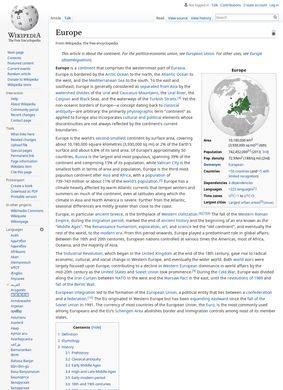The vast information portal, Wikipedia, provides comprehensive coverage of the topic Europe. The depth of content and wide range of subjects are astonishing, exploring various dimensions of Europe, all meticulously organized. From generally known concepts such as culture, politics, and geography to more refined fields such as geological characteristics, economic history, and demographics, the site delves into details, punctuating the narratives with specifics.
Stellarly organized, the main page divides the content into separate sections, providing a holistic view of Europe. Users are greeted with a versatile drop-down menu at the beginning, directing them to sections like history - which further branches into several subsections, including prehistory, classical antiquity, modern periods, and more. The site skillfully traces the development of the European narrative from its early history to modern definitions in succinct language that is easy for readers to understand. The article also navigates through insightful facets of European society, listing ethnic groups, major cities, and the subtle dynamics of migration.
Apart from the rich tapestry of history, the site creates an informed discourse on the geographical aspects of Europe. It thoughtfully navigates through diverse topics such as climate, flora, fauna, and geology, complementing this exploration with detailed subsections that illuminate the specificity of cultural nuances. Additionally, the discussion extends to paint an in-depth picture of Europe's political landscape and comprehensively lists the states and territories contained within the continent.
The database goes further to tackle economic perspectives, delineating the continent's economic history in a separate section that reflects the site's commitment to granular detail. Additionally, the dissection of Europe's culture, expressed through various subtopics including sports, gives users an enriching insight into the region's societal aspects.
The content is accessible in an astounding 296 different languages, solidifying the page's statute as an all-encompassing repository of knowledge. Moreover, the accessibility features, like links that take users to directly related content, create account and login options, enhance user experience significantly. Substantial resources are also assigned, with an extensive list of references, sources, and external links provided, making it an indispensable tool for further exploration and research.
Verdict: Wikipedia's information on Europe is an impressively diverse and vast resource. Devoid of superlatives or exaggerated language, the content retains a balanced flavour, making it an excellent neutral hub for data on Europe. It follows a structured, unambiguous articulation style and vibrant readability, providing an all-round view into the continent's characteristics and dispenses large volumes of information in a well-segmented layout, further validating Wikipedia's dominance as a preeminent online encyclopedia.
